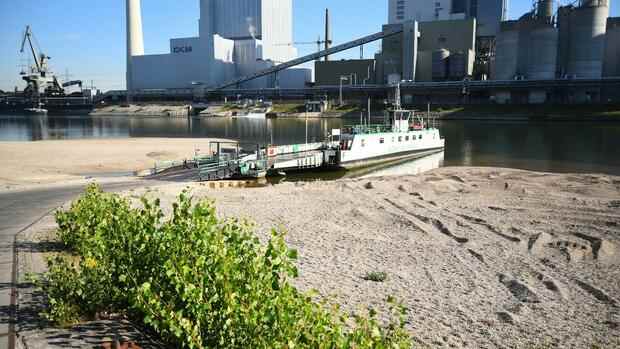A ferry lies at the port in Mannheim.
(Photo: dpa)
Dusseldorf The temperatures are climbing to record levels – this is pushing German energy suppliers to their limits, among other things. On Thursday, the Düsseldorf power plant operator Uniper reported that the low water level in the Rhine was endangering coal supplies for the Staudinger 5 plant in Großkrotzenburg in Hesse. In addition, there could be irregular operation in Block Datteln 4 from August 4th to September 7th, “since the coal quantities on site are limited due to the low water level of the Rhine,” said the energy supplier on the EEX electricity trading portal.
Other operators are also closely monitoring the situation. The power plants of the hard coal group Steag no longer reach the maximum possible output: “With such high outside temperatures as currently, the blocks no longer achieve their maximum output,” said a spokesman for the company at the request of the Handelsblatt.
The Baden-Württemberg energy group EnBW has already had to restrict the operation of its grid reserve systems in Heilbronn, Marbach and Walheim. Certain power plants take water directly from the rivers for cooling, after which it is fed back again. However, certain maximum temperatures must not be exceeded. In addition to the water temperature, the lack of rain is a problem for the energy companies.
If the water level drops, ships can no longer be loaded as usual, and supplies to coal-fired power plants could be affected as a result. Hot and dry months always present energy suppliers with challenges.
Top jobs of the day
Find the best jobs now and
be notified by email.
The Federal Association of German Inland Shipping (BDB) only warned in Duisburg on Wednesday: “The current low water is increasingly hindering freight shipping in Germany.”
Situation more extreme than in the hot summer of 2018
According to current data from the Electronic Waterway Information Service (Elwis), the level at the important measuring point Kaub between Koblenz and Mainz was 55 centimeters on Thursday and could drop to 46 centimeters by Sunday.
“There are currently restrictions on shipping on the Rhine due to the low water levels,” confirms EnBW. The number of “operational ships” as well as the possible loading quantities are therefore reduced. “The situation is tense for all rail transport service providers. We are in close contact with all parties involved in order to make optimal use of the limited resources and welcome the efforts to prioritize the rail transport of energy commodities.
Most recently, in the hot summer of 2018, there were sometimes major power plant throttling. At that time, the Essen power plant operator Steag had to reduce the output of its coal-fired power plant in Bergkamen in the Ruhr area, and EnBW even had to shut down a steam power plant completely.
“If we compare this summer with 2018, the situation is already much more extreme than it was at the beginning of August four years ago,” says meteorologist Robin Girmes, head of the weather agency Energy Weather. According to the expert, relaxation is not in sight for the time being.
“At this water level, three meters are normal (currently 1.8 in Duisburg-Ruhrort, Note d. editor), the cargo ships can only be loaded with a maximum of half their normal cargo,” explains a Steag spokesman. Although the situation is still relaxed thanks to full warehouses, if the water levels continue to fall, “this could also lead to certain performance restrictions in our systems”. The Essen-based company emphasizes that the supply is currently still secured.
“If we compare this summer with 2018, the situation is already much more extreme than it was at the beginning of August four years ago.” Robin Girmes, head of the weather agency Energy Weather
Even if some rain is reported in the next few days, meteorologist Girmes doesn’t really see any improvement: “The soil is so dry that two days of rain won’t help.” In the worst case, the situation could even drag on into the fourth quarter.
Only RWE seems optimistic: There are currently no heat-related restrictions in power plant operation, said a company spokesman at the request of the Handelsblatt. “Nor do we expect to have to throttle power generation for this reason in the near future.”
However, according to the current forecast by the Federal Institute for Hydrology (BfG), the next six weeks will be drier than usual. This should also cause water levels to drop further.
More: What you should now consider when replacing oil heating and gas heating

